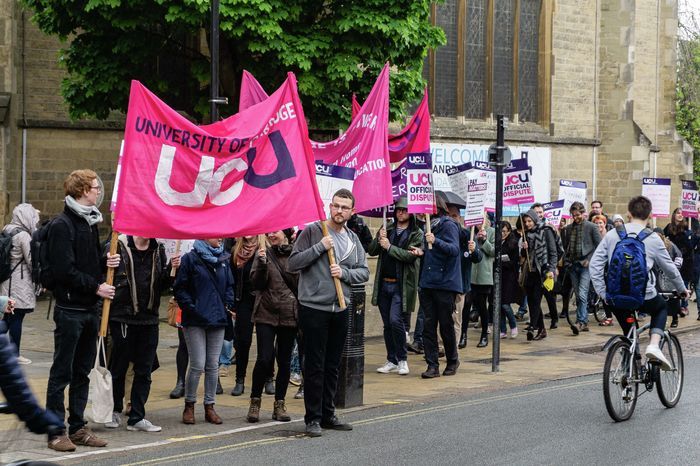Cambridge takes part in ‘biggest strike in UK higher education history’
The UCU reported record turn-outs on the first two of its planned strike-days

The Cambridge branch of the UCU has joined over 150 universities across the country on the 24th, 25th in what has been billed as the “biggest strike in the history of UK higher education”. Another day of strike action is planned for the 30th November.
Nationally, 150 universities are striking in co-ordinated action over pensions, pay, and working conditions in higher education.
Cambridge UCU reported record turn-outs on the first two of planned strike-days, with pickets at Downing site, the Education Faculty, Sidgwick site, Senate House and Cambridge University Press.
Varsity spoke to the academics on the picket lines.
For Julia Guarneri, an associate professor of History, pensions are a major reason for resorting to strike action. In April, Universities UK (UUK) imposed major cuts to the academics pensions scheme (USS). According to UCU research, over 195,000 staff across the country will lose up to 30-35% of guaranteed future retirement income with the new changes.
Amidst crowds chanting ‘pay and pensions now’ at the Kings Parade rally, Guarneri says, “I found the decision really insulting”.
The agreed demands also include addressing excessive workloads and unpaid work, “we don’t have defined hours and workload is completely untenable”, says Guarneri, “we’re not given time in the working day to do the research required for good teaching. Because I prioritize my students’ education, I then do it on my own time.”
She said, “I’m teaching a paper right now where we upload lesson outlines before the lecture. Everyone is uploading them at midnight, two in the morning, four in the morning. Doing this continually, while having a family, having to then take kids to school - your body has no time to recuperate.
“It’s affected my health. Something’s got to change. We shouldn’t have to work damaging hours in order to deliver the teaching students deserve”.
Pay and conditions are also part of the dispute. The University and Colleges Employers Association (UCEA) had previously offered a 3% pay package that was rejected.
“It’s really frustrating to have this framed as anything but a pay cut, with the cost of living that’s hitting right now”, Guarneri says.
The UCU is demanding a pay rise 2% above inflation. Action on gender, ethnic and disability pay gaps is also part of the dispute.
Precarious employment practices are also under fire. Last year, research suggested over half of undergraduate supervisions are provided by ‘gig economy’ supervisors who lack proper contracts. On the second day of strikes, the ‘Justice for College Supervisors’ campaign delivered an open letter with over 1200 signatures to the Senior Tutors’ Education Committee (STEC) and the Office for Intercollegiate Services.
Varsity spoke to Sophie Marie Niang, a supervisor at the Sociology department. As a PhD student, Niang tells Varsity, “the research funding I get is not enough to make ends meet in Cambridge, so I supervise to pay the bills”.
“At the moment, I get paid less than minimum wage. There’s no security to it either, and together that makes for stress to just bleed into everything”, Niang says.
The Justice for College Supervisors campaign is calling for hourly-paid supervisors to be given a pay rise to living wage levels, secure contracts, and pay for mandatory training sessions.
This is the fifth year of strike action at the University of Cambridge. However, this year the UCU became the first education union to secure a national strike mandate since the tightening of trade union laws in 2016, with over 80% member approval vote.
UCU General Secretary Jo Grady said: “if vice-chancellors doubted the determination of university staff to save our sector then today has been a rude awakening for them.
“We have been overwhelmed by the support of thousands of students who have joined us on the picket lines. They recognise that vice-chancellors are wrecking the sector for staff and students alike and are determined to stand with us and fix it.
“Our members deserve a proper pay rise and the money is there to deliver it. Vice-chancellors now need to urgently address the concerns of staff otherwise our 70,000 members will escalate this dispute into next year.”
As strikes continue next week, disruption of university teaching hours are expected, as well as faculty libraries, University Library, University Information Services technical support, and other University services.
College-based teaching is not affected by the strike, with supervisions still going ahead.
 Arts / Plays and playing truant: Stephen Fry’s Cambridge25 April 2025
Arts / Plays and playing truant: Stephen Fry’s Cambridge25 April 2025 News / Candidates clash over Chancellorship25 April 2025
News / Candidates clash over Chancellorship25 April 2025 Music / The pipes are calling: the life of a Cambridge Organ Scholar25 April 2025
Music / The pipes are calling: the life of a Cambridge Organ Scholar25 April 2025 Comment / Cambridge builds up the housing crisis25 April 2025
Comment / Cambridge builds up the housing crisis25 April 2025 News / Cambridge Union to host Charlie Kirk and Katie Price28 April 2025
News / Cambridge Union to host Charlie Kirk and Katie Price28 April 2025






